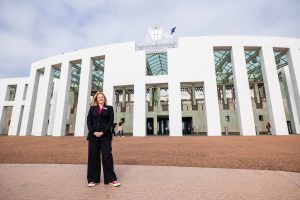The Australian Alcohol Guidelines say you should not drink alcohol when pregnant or planning a pregnancy.
Evidence shows drinking alcohol while pregnant can cause miscarriage, stillbirth, low birth weight, and pre-term birth. Alcohol during pregnancy can also damage a developing baby’s brain and cause Fetal Alcohol Spectrum Disorder (FASD) — the leading preventable developmental disability in Australia.
So it is shocking to consider that, until a year ago, alcohol companies in Australia weren’t required to carry a health warning on their products about the risks of alcohol during pregnancy.
But all of this changed last year — alcohol products in Australia are now required to carry a warning that alcohol can cause lifelong harm to a developing baby if consumed during pregnancy. All alcohol companies must have these warnings in place before 31 July 2023.
An effective health warning label on alcohol products may seem like a small thing, but it can make a significant difference in the lives of many. It informs the community about the need to avoid alcohol during pregnancy, enabling supportive environments for alcohol-free pregnancies.
But this victory didn’t happen overnight.
Seeing mandatory visible health warning labels on all alcohol products was a moment that people with FASD, their families, health groups, and community organisations have been fighting for more than 20 years.
So how did we get here?
In July 2020, Food Forum Ministers in Australia and New Zealand were to meet to vote on alcohol product health warning labels developed and proposed by independent regulator Food Standards Australia New Zealand (FSANZ).
But alcohol corporations and their lobby groups responded quickly with a campaign against the evidence-based label called ‘Not This Label’.
Health advocates knew this was the chance to finally get real, tangible change. But at the same time, they also knew alcohol corporations would be lobbying hard and doing whatever they could to continue to prevent the warning labels from going ahead.
And this is where the community showed up.
Thousands of Australians from around the country put incredible heart and energy into making sure powerful alcohol corporations would not drown out community voices in the fight for these warning labels.
Parents of children with FASD, like Cheryl Dedman, wanted to make sure that their experiences were heard by decision-makers.
FARE stepped in to support people with FASD and their families in their fight to be heard. With our understanding of the media landscape and campaigning experience, we shared insights into the policy-making process, helped people navigate conversations with decision-makers and created video content to reach a wider audience via social media.
The community was passionate about securing this change.
On one occasion, Cheryl was caravanning with her family, while speaking on the phone to the team about the next steps of the campaign, all while watching over her son as he carefully boiled a kettle to make her a cuppa.
While campaigning on the road in her caravan, there were several days when Cheryl didn’t have access to electricity. So her husband Pete would hook her laptop up to their car and idle it for a couple of hours, so she could keep communicating with decision-makers.
At the same time, we gathered support from people across Australia by asking them to sign an open letter which called for clear, visible health warnings. You can read the open letter here.
We mobilised 180 organisations and more than 4,000 community leaders, families, health professionals and researchers to ensure the stories and experiences of people with FASD were heard.
When the ministers met in July 2020, they listened to the community and placed the health and safety of families first by voting to have mandatory, visible and effective health warning on alcohol products.
And just like that, visible pregnancy health warnings were mandated on all alcohol products in Australia and New Zealand.
Getting these mandatory visible health warnings is a significant victory for all of us, especially people in the FASD community — but we still have a long way to go, including the need for FASD to be formally recognised as a disability to help ensure people with FASD get the support their need.
While health experts and advocates continue to push for reforms in this space, on this 1-year anniversary of this inspiring victory, let us be reminded of the power of community advocacy and that we too have the power to bring about real change towards an Australia free from alcohol harms.







